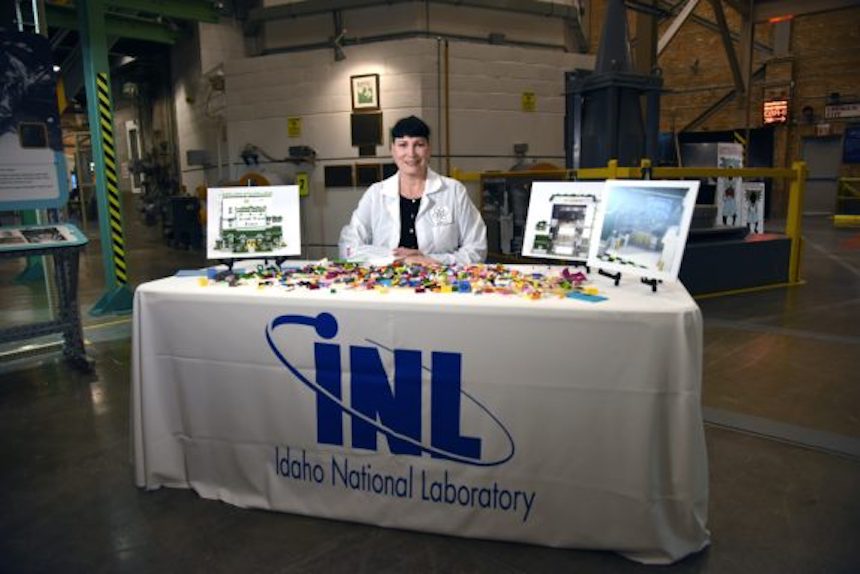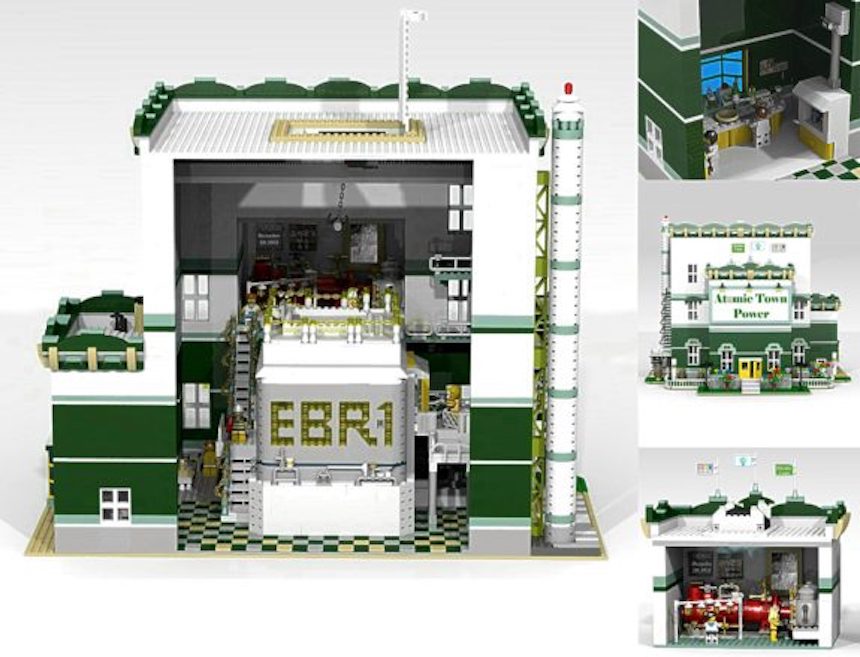INL researcher builds reactor out of LEGO, and she wants you to build one too
Published at | Updated at
Of all the researchers at Idaho National Laboratory, perhaps no one is more “in touch with their inner child” than Dr. Catherine Riddle, but it’s not just children she is trying to reach with her latest endeavor.
LEGO “Atomic Town Power,” a tribute to Experimental Breeder Reactor I, which produced electricity from nuclear fission in 1951, is a 5,857-piece kit still in the concept stage that may one day be available commercially.
RELATED | You’re invited to tour historic nuclear reactor
It started with Riddle, who serves on an INL team seeking new ideas to make nuclear power more understandable — and less foreboding – to the public. At an early brainstorming session, her thoughts quickly turned to LEGO, one of her passions. As an adult, Riddle has had the bug since 2013, when she built Metal Beard’s Sea Cow, a 2,500-piece pirate ship model. It now sits along with several other completed kits on the shelves of her home library.
Following her initial inspiration, Riddle discovered the Danish toy company allows people to submit product ideas.
“LEGO starts a conversation with adults and children,” she said. “I wanted to create an educational tool that sparks interest in nuclear power and is kind of an intro into it, so I came up with Atomic Town Power. It could act as a stepping stone into nuclear energy.”
RELATED | We Are East Idaho: Arco (more on history of EBR-I)
Designing the set was no mean feat. It took Riddle three weeks to get the hang of the software, which offers thousands of brick styles in all different colors. “The sheer enormity of all the choices is amazing,” she said. Then there was the challenge of finding parts that would look like generators and turbines. These ended up coming from a discontinued jet airplane set.
Her methodical nature and research experience was a plus.
“I didn’t get tired of it,” she said.
The longest shift she ever put in was about six hours (“I did take breaks”), and by late April the design was complete.
On the generator level, the Atomic Town Power model includes a string of four LED bulbs, representing the 200-watt light bulbs that went live at EBR-I the afternoon of Dec. 20, 1951. The set also includes a hot cell that can be rotated to the inside of the reactor, a cooling canal for fuel removal, electrical generator, chemistry laboratory, overhead crane to open the reactor lid, reactor control room and reception area. The reactor lid can be opened using the overhead crane to reveal the core design and fuel rods.
“Everything lights up, and you will notice that I put flowers and cacti in the front,” Riddle said. “One of my colleagues said, ‘You put flowers in the front of a nuclear reactor?’, and my response was ‘Yes, I put flowers in front of my reactor. It is clean energy. I want flowers.’ I wanted to make it feel warm and inviting.”
As for people, the cast includes 13 mini-figures: two chemists, two engineers, two physicists, two reactor control room operators, a receptionist, a fireman, two technicians, and a safety control rod axe man (SCRAM). Since LEGO allows creative license, there are female figures in lab coats – something you wouldn’t have seen at EBR-I.
“I made sure to include a lot of women in this one, and I will note there is one who has a white lab coat and a black ponytail. I just couldn’t resist putting myself in the design,” Riddle said.
STEM and clean energy flags fly atop Atomic Town Power.
“It is my greatest hope to not only work towards establishing clean energy but also to educate the next generation in science, technology, engineering and math (STEM),” Riddle said. “What better way for everyone to think ‘clean energy’ than to build their very own EBR-I nuclear reactor?”
After she submitted her design, LEGO gave Riddle a green light to proceed. The key to moving forward now is getting people to vote for it online. The first hurdle, 100 votes, was easy to reach. In fact, Atomic Town Power had more than 1,300 votes by the end of May, as INL has been promoting it on social media platforms, mainly Facebook and Twitter. The challenge now is getting 10,000 votes by late 2020. After that, a panel will consider it for commercialization.
Although confident Atomic Town Power will get 10,000 votes, Riddle recognizes commercialization is not guaranteed.
“It doesn’t mean that it will become a LEGO playset. It just means that once it has received the necessary number of votes, it will be considered as a potential new brick-based LEGO set,” she said. “There are good odds that this will become a limited edition. I read somewhere that 1 in 10 designs become official sets.”
If the set were to be commercialized, LEGO would most likely pare the number of pieces down to around 3,000. The company knows how to do this, Riddle said. “I’ve seen what they do. The changes they make are wonderful.”
If it doesn’t make the cut, however, all will not be lost.
“We will still have the instruction manual, and we’ll make the parts list public,” she said.
Riddle is actually about three-quarters of the way to having all the blocks she needs to build her own version. She has worked with eight vendors, all in the United States, as well as a website called Brick Owl, a marketplace to buy and sell LEGO parts, mini-figures and sets.
Ever the optimist, Riddle has already envisioned two LEGO companion pieces: a spaceport powered by a reactor and a seaport with a nuclear-powered submarine.
“Scientists are artists, and I think that Walt Disney said, ‘If you can dream it, you can do it,'” she said. “But I actually think, ‘If you can imagine it, you can do it,’ because that’s what scientists do all the time.”





